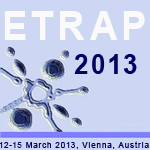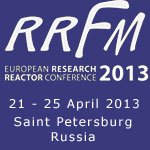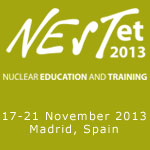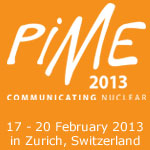

ENS 2012: a report by the SFEN (French Nuclear Society) Young Generation Network.
The ENC 2012 conference kicked off on 10 December 2012, in Manchester (UK). The previous evening participants had attended the eve of conference Welcome Reception in Manchester Town Hall. At this impressive venue, Marco Streit, ENS President, and Norman Harrison, President of the Nuclear Institute and Chairman of ENC 2012, delivered an introductory speech. The Jan Runermark Award 2012 was then presented by the ENS Young Generation Network to Frank Carré, of the CEA (France). The ENC Career Event, which was organised by ENS and also took place on 9 December, was a great success.
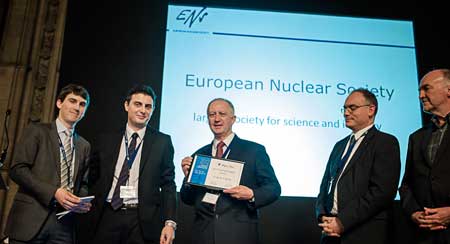
On 10, the Opening Session of ENC2012 featured addresses from senior experts and officials, who welcomed the participants, company representatives and policy-makers in attendance to what is the largest conference in Europe dedicated to nuclear energy.
Keynote speakers then delivered inspiring messages about the current state of nuclear energy and the challenges and opportunities that it faces. Mike Weightman, HM Chief Inspector of Nuclear Installations and Head of the Office for Nuclear Regulation in the UK, recalled the Fukushima Daiichi accident, the follow-up actions taken by the nuclear industry worldwide and some of lessons that have been learned. Mr. Weightman insisted on the specific values that the nuclear industry needs to express and represent, i.e. integrity, resilience, trust, adaptability and the importance of meeting challenges in order to ensure the highest level of safety.
This was followed by a presentation given by Alexander Bychkov, Deputy Director General at the IAEA. He explained that while the Agency’s annual growth forecasts for nuclear energy have been decreasing every year since 2010, they still foresee a rise of at least 25% by 2030 in the number of installed NPPs worldwide.
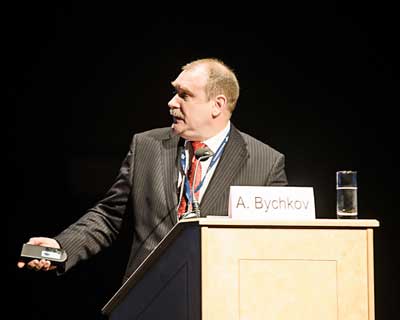
Dr. Tim Stone, Senior Chairman of the British government’s Office of Nuclear Development, which is part of the Department of Energy and Climate Change, reaffirmed how nuclear new build is not only important for his country’s energy mix, but also provides social and economic benefits for UK citizens. Nuclear energy projects could create thousands of new jobs. Dr. Stone hightlighted in a very interesting way the extreme changes that the nuclear energy business has undergone in recent years. He emphasised the need to rethink how to finance new nuclear projects. It seems clear that banking institutions are not prepared to finance the industry in the near future and that new mechanisms, such as institutional support/guaranties, are, therefore, going to be needed. The importance of “system cost” to the integration of grid development costs was also discussed. Last but not least, Dr. Stone reminded participants that TRUST is essential for developing the nuclear industry in the UK. Foreign investors need long-term commitments and guarantees on nuclear energy from government(s) to continue and or restart their investment programmes.
Jean-Pol Poncelet, FORATOM’s Director General, spoke then about public acceptance of nuclear in Europe and about the different reactions that occurred to the accident in Japan in March 2011. To conclude the Opening Session, Sir John Beddington, Chief Scientific Adviser to the UK Governement, stated that the drivers for nuclear energy development are still strong: climate change, population growth and increased urbanisation.
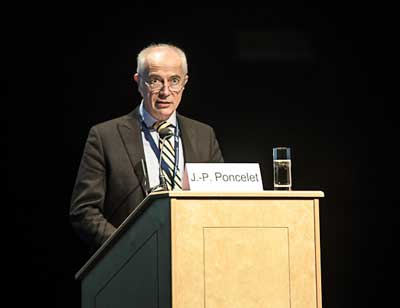
The next session was dedicated to nuclear new build. Vincent de Rivaz, CEO of EDF Energy, recalled the significant progress that has been accomplished by his company lately with regards to new nuclear development. He mentioned the recent site licence granted by ONR for EDF’s EPR project at Hinkley Point. Mr. de Rivaz also stressed the need for taking a prompt decision about going forward with new build projects. In addition, shale gas was also discussed and Mr. de Rivaz expressed the wish that exploration of this gas be accelerated. Last but not least, he urged ENC2012 participants to think “long-term” when making a decision on energy policy.
Eric P. Loewen, Immediate Past President of the American Nuclear Society (ANS), then presented ANS actions with regards to new build projects. Alexey Kalinin from Rosatom reviewed the different new build projects being undertaken by his company, as well as outlining its strategies and values.
The afternoon session was dedicated to Life Science and other applications of nuclear energy. Professor Stephane Lucas (Belgium) presented the challenges of hadrontherapy used in nuclear medicine applications. Cyclotron technology, which is used for 75% of patients worldwide, was also explained. The need to use carbon therapy instead of just protons was then discussed, as was the challenge of developing compact systems using this technology. Professor Lucas’s brilliant lecture helped participants to understand the need for using supraconductive magnets for hadrontherapy.
The next series of presentations were dedicated to the epidemiology of low-dose radiation, to an update on the ITER project - where more than 80% of contracts have been granted – and to the use of nuclear technology for space exploration.
The first day of ENC 2012 ended with a series of parallel sessions, where participants were able to interact with the panel of speakers on several topics, such as new build, the fuel cycle, plant operations or research reactors. A session was also organised by the ENS Young Generation Network on knowledge transfer. In the session on new build projects Dr. Fiona Rayment, from National Nuclear Laboratory (UK), presented the pros and cons of the nuclear fuel cycle in the UK, before discussing advantages of advanced nuclear systems, such as Generation IV projects. Uranium resources, Candu projects and reprocessing were also discussed by the panelists.
Denis Janin,
Guillaume Chaud, SFEN – Young Generation Network |

